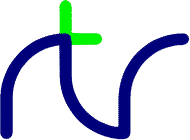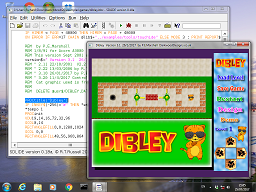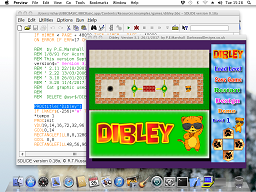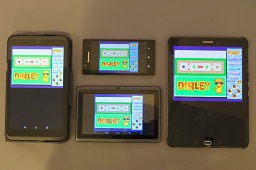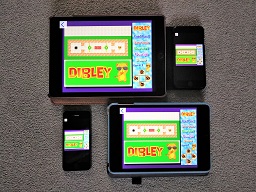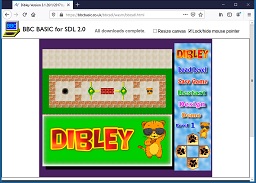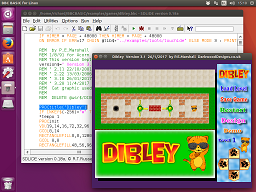
BBCSDL running on Linux (Ubuntu)
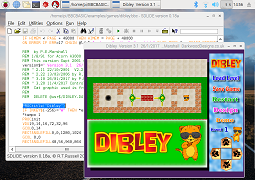
BBCSDL running on Raspberry Pi
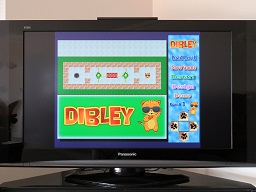
BBCSDL running on Amazon Fire TV
The Desktop editions (Linux, MacOS, Raspberry Pi, Windows) include a BASIC program editor with syntax colouring, live indentation, search & replace and many other features. Built-in diagnostic aids such as run-time trace, listing of variables, single-step execution and a profiler make debugging even the most complex programs straightforward.
The Android and iOS editions, for smartphones and tablets, have a simplified interface optimised for touchscreen control. It too provides a BASIC program editor with syntax colouring, live indentation, search & replace and other features; see here for more details.
The in-browser edition also uses the simplified interface, it is compatible with desktop versions of Brave, Chrome, Edge, Firefox, Opera & Vivaldi and with the Android versions of Chrome† and Firefox Nightly; it will run on a Chromebook. Unfortunately no iOS browsers are compatible (Apple's WebKit currently does not support the Web Assembly Threads extension).
The Android edition will also run on the Amazon Fire TV or Fire TV Stick and some smart TVs. Several of the supplied example programs can be operated using the navigation wheel and buttons on the remote control, including most of the games. Any sounds or music created by a BASIC program will be played through the speaker(s) of the attached TV.
BBC BASIC for SDL 2.0 is largely compatible with BBC BASIC for Windows; it shares with that dialect many new and advanced features including data structures, PRIVATE variables, an EXIT statment, long strings, event interrupts, an address-of operator, byte variables, a line continuation character, indirect procedure and function calls and improved numeric accuracy. It also retains a high degree of compatibility with the BBC Microcomputer, including emulation of the SOUND and ENVELOPE statements, and the MODE 7 (teletext) screen mode.
Up to 256 Megabytes of memory (16 Mbytes in the in-browser edition) is provided for the user's program, data and stack (subject to sufficient RAM being available). Unlike some older versions of BASIC, you won't suffer the frustration of running out of memory! Line numbers are optional.
BBC BASIC for SDL 2.0 incorporates an assembler* which can be used when the speed or other capabilities of the interpreter are inadequate. The assembler depends on the CPU in your device: x86 (32-bit or 64-bit) for Windows, MacOS or Linux; ARM (32-bit or 64-bit) for Raspberry Pi. In the case of Android the assembler is ARM or x86 as appropriate. You can access Application Program Interface (API) functions from BASIC and from assembler code, allowing an experienced programmer to produce sophisticated applications.
BBC BASIC for Windows programs that call Operating System API functions, or that rely on libraries that do not have a direct equivalent in both dialects, will need to be adapted in order to be compatible with BBCSDL. Also, programs that use the *FONT command will require a small alteration. But otherwise programs can be expected to run with little or no modification. Of course, programs that incorporate assembly language code will not run on an ARM-based Android device or Raspberry Pi without significant changes. Details of the differences between BB4W and BBCSDL may be found here.
BBC BASIC for SDL 2.0 is entirely free and may be downloaded for the supported platforms as follows :
| Windows edition (Vista or later) (19.3 Mbytes) |
| MacOS edition (10.7 or later) (22.2 Mbytes) ‡ |
| Linux edition (32-bit, x86 CPU) (18.3 Mbytes) |
| Linux edition (64-bit, x86 CPU) (18.3 Mbytes) |
| Raspberry PiOS edition (32-bit) (18.3 Mbytes) |
| Raspberry PiOS edition (64-bit) (18.3 Mbytes) |
| Android edition (KitKat or later) (23.7 Mbytes) |
| 64-bit iOS edition (see below**) (26.1 Mbytes) |
| In-Browser edition (sorry, not IE or Safari) † |
The MacOS, Android and iOS editions are self-installing. The Linux and Raspberry Pi editions must first be unzipped, and then installed according to the instructions in the supplied text file. The Windows edition simply needs to be unzipped to a suitable place. The in-browser edition needs no installation.
‡ On a Mac you will need to override the "unidentified developer" security warning; there are instructions for doing that
here. Please note that the app is
signed and is therefore protected against tampering; the warning simply means that it has not been reviewed by Apple. This
edition is x86 (Intel) code but will run nicely on an M1 ('Apple silicon') Mac under Rosetta 2 emulation.
† To run in Chrome on Android an 'experimental' feature must be enabled: visit chrome://flags/#enable-webassembly-threads.
Although it will not currently run in mainstream Safari, it will in Safari Technology Preview
release 137 or later.
* The iOS and in-browser editions are exceptions. Because iOS does not permit 'arbitrary code execution' the assembler, the CALL statement and the USR function are not usable. This is a restriction imposed by Apple and is unavoidable.
- Connect your device to a PC or Mac running iTunes™, as you would to sync music or photos.
- When the device has been recognised by iTunes, click on the corresponding icon that appears.
- The Serial Number will be displayed (this is not the UDID); click on it to reveal the UDID.
- Right click on the UDID (on a PC, or the equivalent on a Mac) and copy it to the clipboard.
- Paste the UDID into an email and send it.
- Connect your device to a Mac using a USB cable.
- From the menu select 'About This Mac... System Report... Hardware... USB... iPhone... Serial Number'.
- Despite the description, the number displayed is the UDID (albeit with hyphens removed).
- Copy the UDID into an email and send it.
| Version | Date | Modification summary (click on the version number for details) |
|---|---|---|
| 1.27a | 30-Dec-2021 | Added support for web bundles; updated audiolib and gfxlib libraries; added candle.bbc example program; several minor bug fixes. |
| 1.26a | 19-Nov-2021 | New audiolib & gfxlib libraries; new cowboy.bbc & metronome.bbc example programs; minor compatibility improvements & bug fixes. |
| 1.25a | 08-Oct-2021 | PAGE may be lowered (with care!); new SUM operator (modulo-264 addition); stringlib library updated to support 64-bit integers. |
| 1.24a | 20-Aug-2021 | Added GCOL 5-7; relative plot commands don't discard the LSB; fixed a memory leak on string array initialisation; fixed bugs in SDLIDE. |
| 1.23a | 09-Jul-2021 | Added 64-bit Raspberry Pi edition; added msgbox library; updated BBCEdit; more Mac shortcuts; fixed cruncher bugs, and more. |
| 1.22a | 28-May-2021 | Added more Mac keyboard shortcuts; added cradle.bbc & Box2D sample demos; updated sudoku.bbc; some performance optimisations. |
| 1.21a | 16-Apr-2021 | Supports some Mac keyboard shortcuts; added box2ddbg library; added pinball.bbc & voronoi.bbc examples; several minor bug fixes. |
| 1.20a | 03-Mar-2021 | Fixed FOR...NEXT bug in ARM editions; added f1-f4 shortcuts in Ceefax.bbc; removed timeout from sudoku.bbc; several minor bug fixes. |
| 1.19a | 22-Jan-2021 | Extended *dump cmd; new editbox & menulib libraries; new gorillas & textedit examples; new macro recorder for SDLIDE; bug fixes etc. |
| 1.18a | 04-Dec-2020 | New -borderless switch; PTR() accepts FN/PROC name; pdflib.bbc, raytrace.bbc & saa505x.bbc added; BBCEdit updated; bug fixes etc. |
| 1.17a | 23-Oct-2020 | New shaderlib and webgllib libraries; BBCEdit IDE updated; Ceefax.bbc updated to track BBC website changes; bug fixes and more. |
| 1.15a | 11-Sep-2020 | New PTR()= statement and SYS function; SDLIDE has breakpoints and can print a listing; updated Ceefax.bbc & telstar.bbc; bug fixes etc. |
| 1.14a | 03-Aug-2020 | New *dump command, updated IDEs, updated dlglib.bbc & filedlg.bbc, updated SkyBaby.bbc & telstar.bbc examples, bug fixes etc. |
| 1.13a | 19-Jun-2020 | MODE7 & SOUND improvements, smooth listbox scrolling, new classlib & mode7lib libraries, new example sortdemo.bbc, bug fixes & more. |
| 1.12a | 08-May-2020 | Improved file selector, touchide copies directories, new example programs bbclock.bbc, dunebuggy.bbc & kerning.bbc; bug fixes and more. |
| 1.11a | 27-Mar-2020 | Render batching; MODE 7 font changed; new example programs spotlight.bbc, pintograph.bbc & trebuchet.bbc; bug fixes and more. |
| 1.10a | 15-Feb-2020 | Box2D physics engine bundled; kaleidoscope.bbc, crates.bbc, dangle.bbc & lotto.bbc example programs added; bug fixes and more. |
| 1.09a | 11-Jan-2020 | New Memory Monitor utility, dlglib library improved, Ceefax simulator updated to include weather, travel & local news, and more. |
| 1.08a | 01-Dec-2019 | Bug fixes, eventlib made 64-bit compatible, added ellipsefit.bbc, bezierfit.bbc and multitouch.bbc example programs, SkyBaby updated. |
| 1.07a | 20-Oct-2019 | Bug fixes, treeview has a scrollbar, aagfxlib supports dotted/dashed lines, listboxes can be drag-scrolled, new SkyBaby example program. |
| 1.06a | 03-Sep-2019 | Antialiased graphics (via new aagfxlib library); assembler fixes; aagfxdem.bbc, knots.bbc & BBSterm.bbc example programs added. |
| 1.05a | 25-Jul-2019 | Bug fixes, Goto Line in SDLIDE, combobox support, updated DejaVuSans font, new fluid.bbc & 3D animation to accompany skaters.bbc . |
| 1.04a | 23-Jun-2019 | VDU 23,24,n| adjusts character spacing; @tmp$ is now always user-specific; hangman.bbc & figleaf.bbc example programs added. |
| 1.03a | 12-May-2019 | BBCEdit IDE updated; Search BASIC programs utility added; multi-column list boxes; mandel.bbc rewritten to run on all platforms. |
| 1.02a | 04-Apr-2019 | ARM & 64-bit editions buffer files; dlglib includes trackbar support; new polydots & recorder examples, telstar.bbc updated, bug fixes. |
| 1.01a | 23-Feb-2019 | VDU 23,23 works with circles/ellipses/arcs; RECTANGLE SWAP added; SDLIDE improvements; disco, slitscan, surks & swirl examples. |
| 1.00a | 01-Feb-2019 | SDLIDE loads Acorn-format files, Cross Reference utility, ARM align directive, ellipse & treeview libraries, seascape & ellipses examples. |
